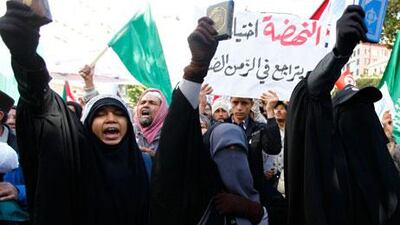TUNIS // The thousands of people gathered in the capital city's main avenue for yet another rally in support of Ennahda, the dominant political party, masked the deep ideological and political splits laid bare in the aftermath of a political assassination that shocked the country.
"The people want national unity," chanted the crowd on Saturday as they were addressed by prominent members of the moderate Islamist grouping, while politicians said that unity of the party and its political allies was the only way out of a period of political upheaval. Giant Ennahda and national flags waved over the heads of the cheering masses.
But there are growing divides between pragmatic and religious parts of the party that has dominated Tunisian politics since the exit of president Zine El Abidine Ben Ali. They separate dogmatic Islamists from those prepared to compromise, reflecting national fault lines which increasingly separate ordinary Tunisians.
With the killing of Chokri Belaid, an outspoken secular politician, on February 6, anger at the Islamist-led interim government which had been simmering among people and the media boiled over and pressure on the party ratcheted up.
The streets filled with protesters and liberal newspapers blamed the death squarely on Ennahda - if not for actually committing the crime, then for allowing security to get so lax that the assassins were not stopped.
The political opposition renewed long-standing calls to replace the Islamist leaders of key ministries - defence, interior, justice - with compromise candidates.
While Ennahda's leader, Rached Ghannouchi, has tried to weather the criticism, slamming the "media of shame" and denounced a "coup d'état against the Tunisian government", the party's prime minister has taken a markedly different tack.
Hamadi Jebali announced immediately after Belaid's death that he proposed to dissolve the government, replacing the ministers with apolitical technocrats.
While his talks with political parties continue, and he has repeatedly postponed the unveiling of his proposed government, the plan sets Mr Jebali apart from the rest of the party as a man prepared to compromise, say analysts.
"Ennahda has always been a big tent party," said Shadi Hamid, of the Brookings Institute in Doha, who was recently conducting research in Tunisia. "It has different currents within it - there is a liberal wing, there is a conservative wing."
The party has tended to settle its differences with a democratic voting process, he noted, as it did when it was controversially decided not to include Sharia in the draft constitution.
Mr Hamid said that while Mr Jebali had some support for his pragmatic stance within the party, he lacked the popular momentum to strike out on his own politically, and the party was likely to remain cohesive for the moment.
However, he added, the uproar and dissent "makes clear that Ennahda and its partners have to do a better job delivering ... it might push them to reassess and rethink about how they can be more effective".
The most pressing concern, he said, was the one of political violence, an issue all but unknown in Tunisia until about a year ago but one that has crept up gradually. After Belaid's death, Ennahda offices were burnt across the country, and groups known as the Leagues for the Protection of the Revolution have been implicated in attacks on groups and people perceived to be linked with Ben Ali's regime.
But a survey released this week by the International Republican Institute, conducted in December and January, indicated that Tunisians were at least as worried about the economy and provision of services as they are about security. In answer to a question about the top priority of the government, 43 per cent responded that it should be employment, while 12 per cent said security.
Concerns about the role of religion in society, or "social reform", which constitute much of the political debate in Tunis, were barely mentioned by respondents.
"The government is not doing any work. It is not making the economic and social situation better," said Hamadi Redissi, a politics professor at Al Manar university. Most people, he reckoned, would not mind whether the government was made up of technocrats or elected politicians if it were able to address the high unemployment among graduates and decline in security that plague the country.
Crucial to the success of any new government, he added, was support in the regions. Tunisia's uprisings began in rural areas after the gap between rich and poor grew wider, and violent demonstrations still happen primarily in the interior. The country's powerful labour unions would also need to be in favour of any new government for it to function effectively.
"I am not sure that a government of experts will take over easily, or if it will last until the next elections" tentatively scheduled for June but unlikely to happen this year, he said. "Probably we are going to face another crisis in the coming months."
Mr Redissi welcomed debate within Ennahda, but like many liberal Tunisians, found much to be disappointed about in the party.
"It is using the democratic apparatus to have hegemony on the media and the bureaucracy," he said. "And worse, the constitution is not drafted, we have no electoral code. That is a real problem. They have broken the situation and they are wasting the time of the Tunisians."
afordham@thenational.ae

